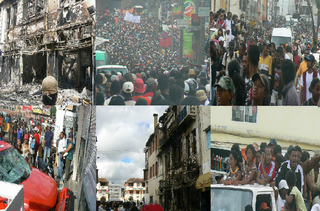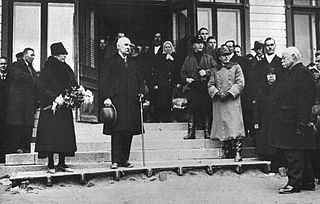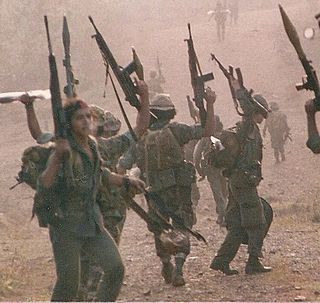 W
WThe 1949 Kemi strike was a strike in July–August 1949 by the workers of Kemi Oy in the Northern Finnish town of Kemi. On August 18 the strike escalated on a violent clash called "Kemi Bloody Thursday" between strikers and local police, two workers were killed and several injured. Kemi strike is so far the last fatal political protest in Finland.
 W
WThe 2009 Malagasy political crisis began on 26 January 2009 with the political opposition movement led by Antananarivo mayor Andry Rajoelina, which sought to oust President Marc Ravalomanana from the presidency. The crisis reached its climax on 21 March 2009 when Andry Rajoelina was declared the president of the High Transitional Authority of Madagascar, five days after Ravalomanana transferred his power to a military council and fled to South Africa.
 W
WBlutmai refers to the 1929 killing of 33 Communist Party of Germany (KPD) supporters and uninvolved civilians by the Berlin Police over a three-day period, after a KPD International Workers' Day celebration was attacked by police. In defiance of a ban on public gatherings in Berlin, the KPD had organized a rally to celebrate May Day. Although fewer supporters showed than what the KPD had hoped, the response by the police was immediate and harsh, using firearms against mostly unarmed civilians. During the three days of rioting that followed, 33 civilians were killed, around 200 injured, and over a thousand taken into police custody. One policeman was injured. The event was a significant moment in the decline of the Weimar Republic and its political stability. The incident also marked a turning point in relations between the centre-left SPD government and the far-left Moscow-aligned KPD, weakening any prospect of a united left-wing opposition to fascism and the rising National Socialist German Workers Party. The brutality of the police's response also led to a further erosion of public trust in the government.
 W
WBy any means necessary is a translation of a phrase used by Martinican intellectual Frantz Fanon in his 1960 Address to the Accra Positive Action Conference, "Why we use violence". The phrase had also been used by French intellectual Jean-Paul Sartre in his play Dirty Hands in 1948. Later, it entered the popular civil rights culture through a speech given by Malcolm X at the Organization of Afro-American Unity founding rally on June 28, 1964. It is generally considered to leave open all available tactics for the desired ends, including violence.
 W
WDomestic terrorism or homegrown terrorism is a form of terrorism in which victims "within a country are targeted by a perpetrator with the same citizenship" as the victims. There are many definitions of terrorism, and none of them are universally accepted. The United States Department of State defined terrorism in 2003 as "premeditated, politically motivated violence perpetrated against noncombatant targets by subnational groups or clandestine agents, usually intended to influence an audience." There is no Federal criminal offense designated as domestic terrorism.
 W
WThe Green Bay Massacre was a covert operation on 5 January 1978, in which five Jamaica Labour Party supporters were shot dead after being lured into an ambush at the Green Bay Firing Range by members of the Jamaica Defence Force.
 W
WThe Jyväskylä library stabbing took place on January 30, 2013, when members of the Finnish Resistance Movement, a branch of the Nordic Resistance Movement, had organized a demonstration in the city of Jyväskylä, Finland, and protesters assaulted three individuals as a group.
 W
WThe Mäntsälä rebellion was a failed coup attempt by the Lapua Movement to overthrow the Finnish government.
 W
WMisogynist terrorism is terrorism motivated by the desire to punish women. It is an extreme form of misogyny, the policing of women's compliance to patriarchal gender expectations. Misogynist terrorism uses mass indiscriminate violence in an attempt to avenge nonconformity with those expectations or to reenforce the perceived superiority of men.
 W
WPolitical kidnapping is kidnapping which is conducted to obtain political concessions from security forces or governments.
 W
WThe Ståhlberg kidnapping refers to an incident that occurred on October 14, 1930, at approximately 9:00 AM EET, in which the former and first President of Finland, Kaarlo Juho Ståhlberg, and his wife, Ester Ståhlberg, were abducted from their home in Helsinki, Finland, by members of the Lapua Movement. The kidnapping was spearheaded by an ex-White general by the name of Kurt Martti Wallenius. Threats of execution were issued when the Lapuans' demands were not met, however Wallenius and his henchmen were too incompetent to handle the kidnapping and too hesitant to carry out their murder threat. The Finnish public was both ashamed and horrified by this pointless act of lawlessness, and a general adverse reaction against the Lapuans greatly eroded their already dwindling popular support. In addition to this, the kidnapping was decisive in forcing the election of Pehr Evind Svinhufvud to the presidency against Ståhlberg in February 1931. After the kidnapping the Lapuans threatened to assassinate Ståhlberg.
 W
WIn international relations, violent non-state actors (VNSA), also known as non-state armed actors or non-state armed groups (NSAGs), are individuals and groups that are wholly or partly independent of state governments and which threaten or use violence to achieve their goals.